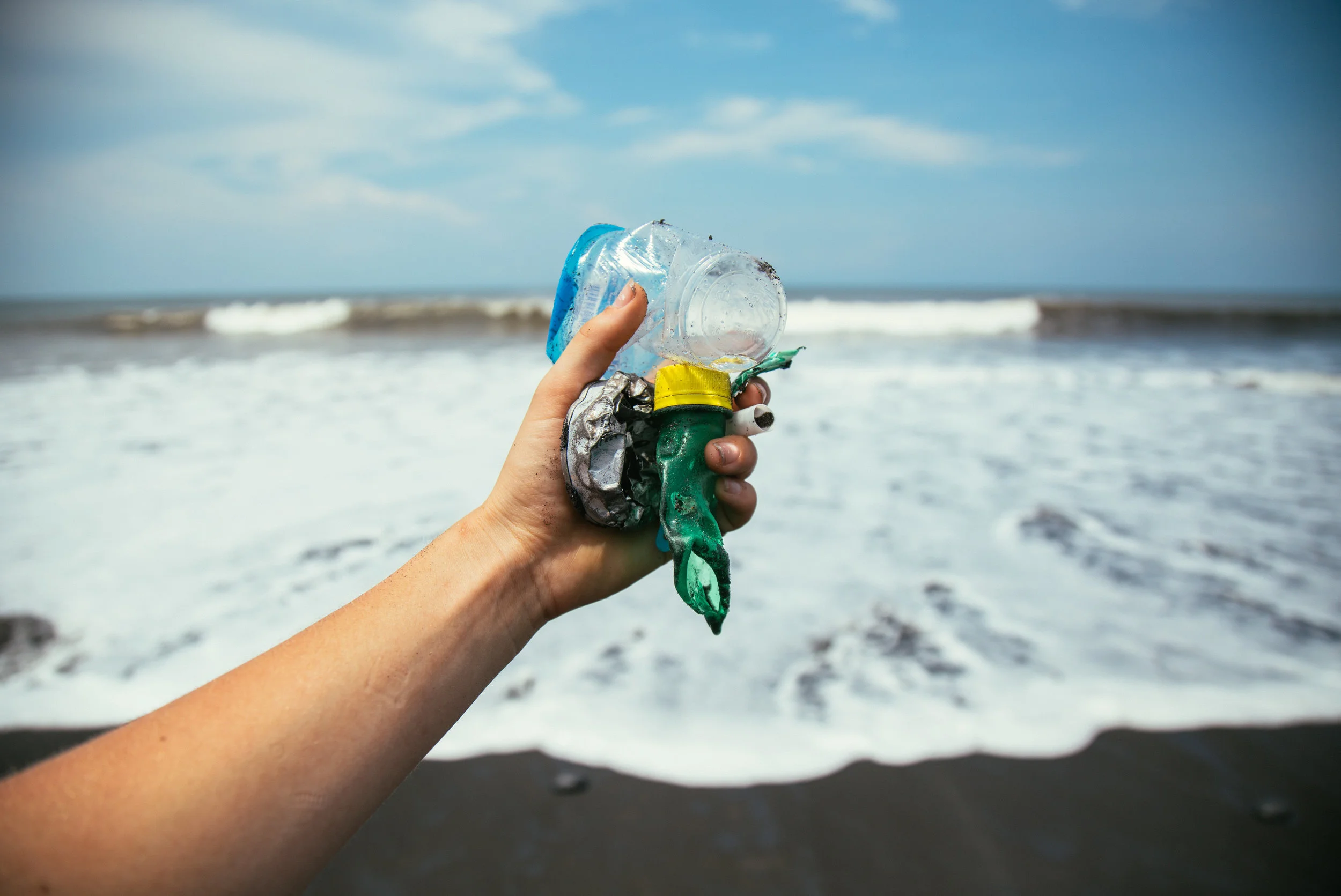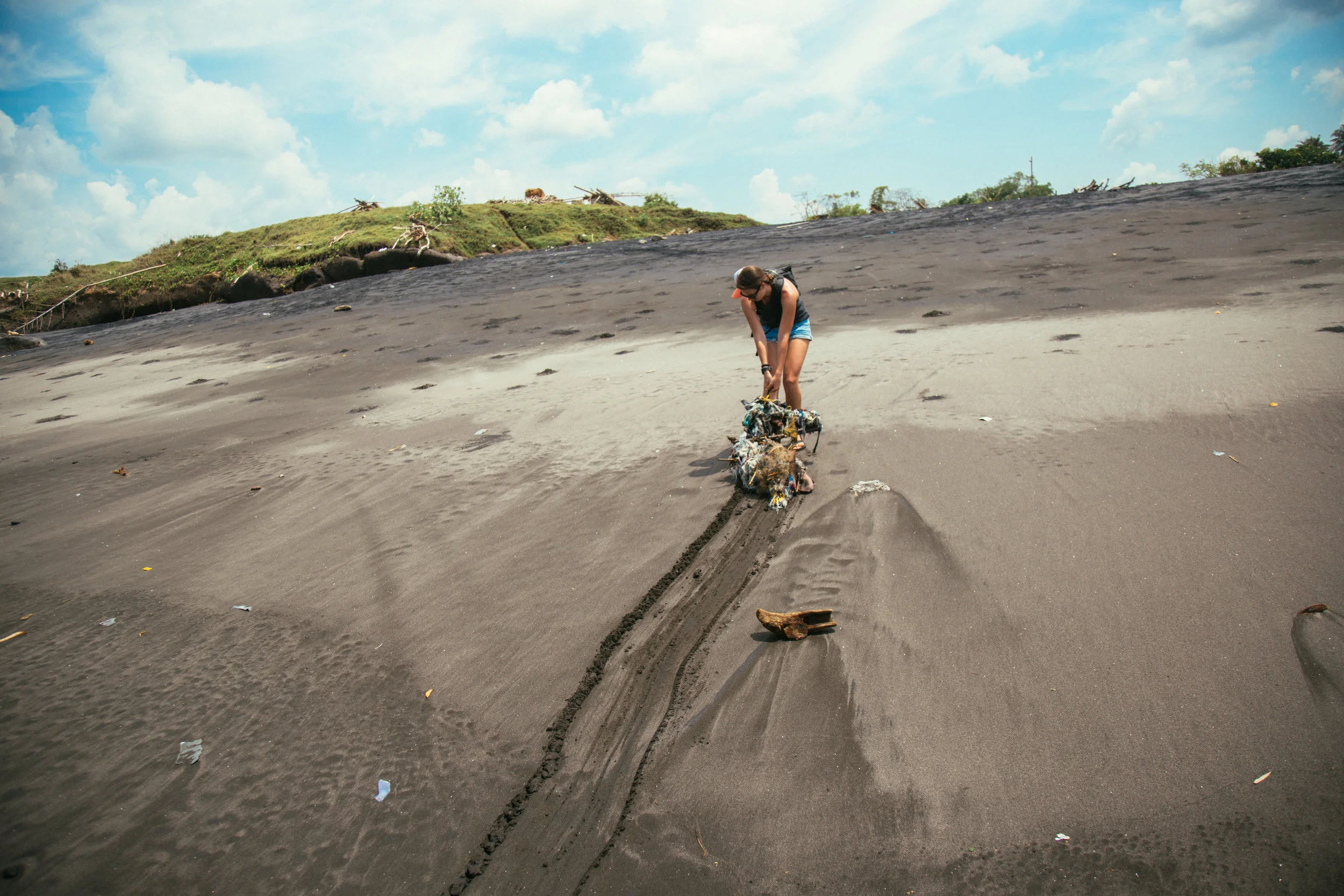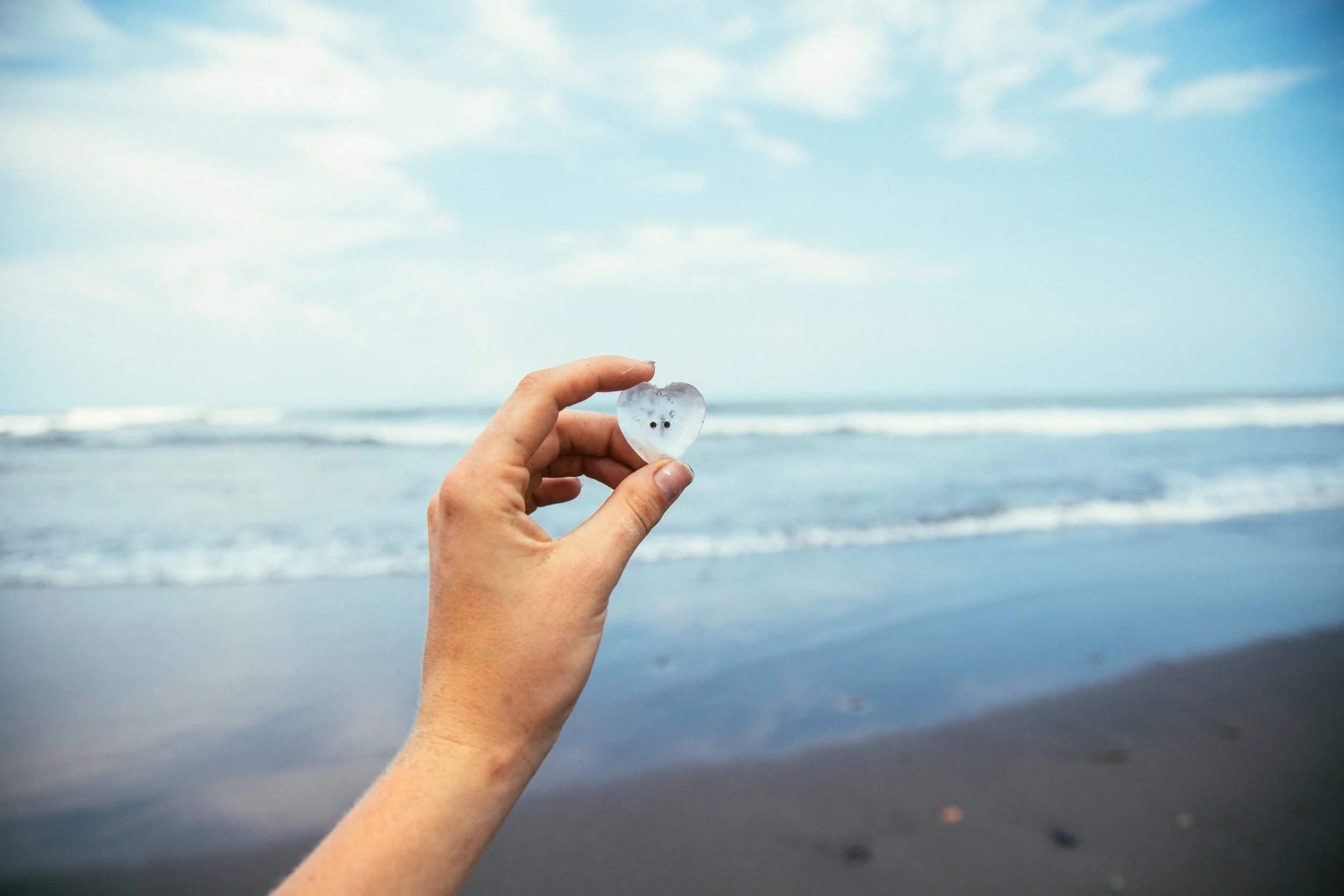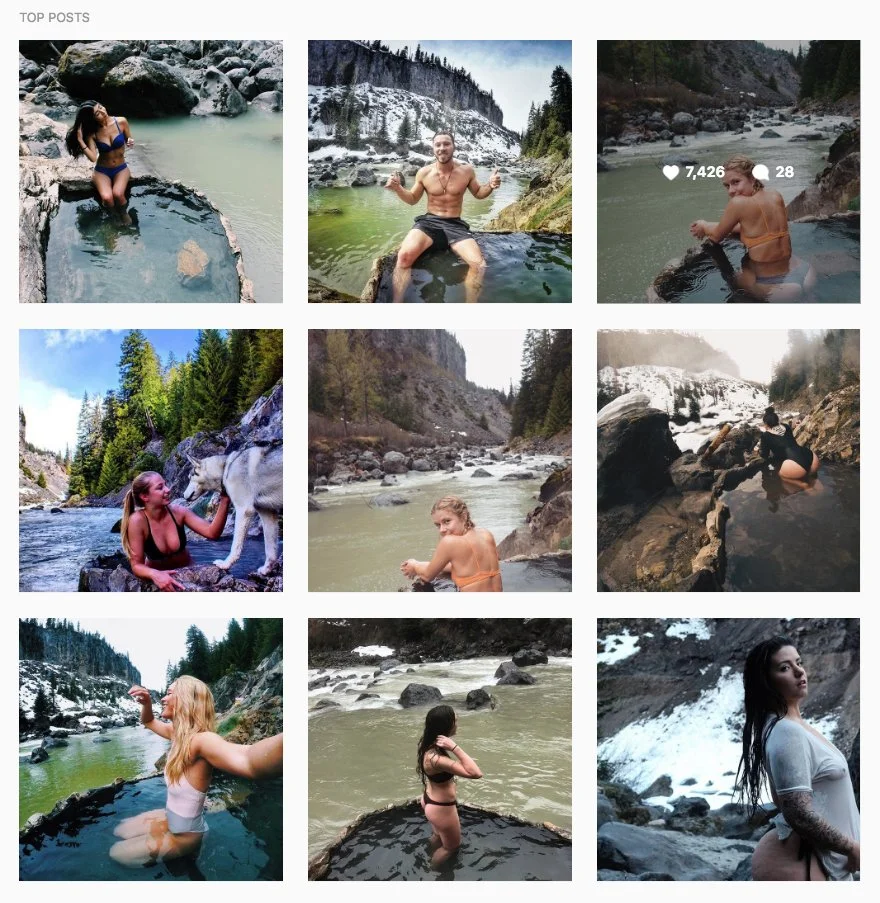Rambling: #TRASH TALK. Sporks, fake boob inserts on beaches, And the rise of people visiting the outdoors.
#TrashTalkBC
Joffre Lakes Provincial park.
Photo: Vince Emond
“First the Keyhole Hot Springs, now Joffre Lakes; our parks are getting destroyed.
Devan Francis and myself carried nearly 40lbs of other people’s garbage down from Upper Joffre lake. Massive tarps, tent, party cups, etc, found in mini dumps of garbage along the side of trail. We dodged so many tourists on the hike down that it made me realize: I wonder how many people walked past all that garbage and didn’t think to collect it and dispose of it properly...
The crowds are growing, and so should our responsibility. We’ve all heard it: “Pack it in, Pack it out”...but this time what if we take it a step further and pack out things that don’t belong to us? Bring an extra garbage bag or small pack to collect any rubbish you find. Maybe make it a game with your friends? Either way our parks stay clean and you help spread awareness! Can anyone out there help spread this message? ”
We've all heard about it, seen it, even been the culprit behind it accidentaly once and awhile.
Garbage and Pollution is a Worldwide problem. From the shores of small remote islands to literal piles of shit at base camp Everest. There is garbage everywhere. Humans are a wonderful, creative and powerful species but we are also our own worst enemy. And with the growing presence of #Exploremore and #keepitwild across social media platforms it makes me want to step back and ask; "Are we REALLY keeping it wild?" We all spread the message to get outside more and post pictures of beautiful women with flowing hair standing in front of mountain peaks. Its an amazing way of sharing what is important, being active, pushing your limits and seeing new places. But its the hyper focus on those specific images that tends to hide the reality that comes when large amounts of people flock to "Instagram Hot Spots." Reality being trash. Plastic cups, bottles, tarps, food, fecal matter, you name it and it has probably been left along a trail, dealt with by locals or stashed somewhere near by. Most recently exposed by a couple friends of mine who went for a spring hike up to Joffre lakes park, which has grown in popularity exponentially in the last few years with both Beautiful blue lakes in IG posts and recent Trail improvements. In this instance ( CBC Story linked here; CBC Joffre lakes ) they hauled out at least 40lbs of stashed trash left along the trail and hidden behind boulders. Forty pounds! This is not okay. This is the reason that places like the mentioned Keyhole Hot springs also located in Pemberton gets shut down.
Now, these bears at Keyhole are becoming aggressive towards people and reliant on food. It is a sad truth and entirely our fault. These bears risk getting shot by rangers over the carelessness of sometimes only a few. However, that carelessness also ruins the area for the people who do care for the areas they visit. This risks human and animal life and the whole structure of the forest when people are negligent. Even birds and other small animals are not immune to the hazards of left behind food and trash because; simply, people food is not meant for critters. However; In this situation, the hot springs are closed to the public for at least two years so the bears can disconnect the connection between visitors and food. Two years. And already I'm sure (not positive) that at least a couple people have decided to venture in against the threat of fines and making a bad situation worse.
Mount Cook. One of the most beautiful places I have ever been lucky enough to visit, and Im still finding garbage, right on the rocky beach and the trail up to it.
But back to the problem of trash. No matter where I go there is a problem, or at least a presence. I've been travelling for eight months until just recently returning home. I've been to beaches across the pacific top to bottom. Hawaii, Bali, Australia, Japan, New Zealand. And none of these countries are exempt from me finding garbage where it shouldn't be. The only one that was pretty on top of things was Japan, although their lack of waste bins in public areas and still present waste around popular tourist locations is an issue, all together their recycling protocols are off the wall.
When it comes to ocean pollution, Bali was the first place that I saw the true state of how things really are. I've picked up the odd bit of plastic in Hawaii on my visits and seen garbage on trails like anywhere, but it does not even come close to Indonesia. Indonesia is second only to China for the overall contribution to ocean waste in the world. First off, there isn't the infrastructure present to deal with the crazy amount of garbage that is produced, The streets are small and garbage trucks are few and far between and when the rain comes the canals, streams and roads used for garbage disposal flood, bringing any trash straight down into the ocean. Anything else typically gets burned. As you can probably guess, Human waste makes its way down to your surf break as well. Friends of mine where getting ear infections consistently, infected scrapes and cuts. We all worried about the quality of the lukewarm bath water we surfed in. Each day I would paddle out at Old Man's beach in Canggu and sift through bits of plastic wrappings, bottles, the odd dead chicken and have plastic bags wrap around my legs. One morning, before most beach goers are out, I even saw what looked to be a very large Mammal, what I thought to be a cow, being buried on the main beach at low tide, a spot that is easy covered by high tide. So every time I got out of the water I thoroughly cleaned out my ears and rinsed off, making sure there wasn't any water stuck where it could cause problems.
“If Bali doesn’t #DoSomething serious about this pollution it’ll be impossible to surf here in a few years. Worst I’ve ever seen,”
- Kelly Slater
Talking to locals there about the trash problem pointed out a few things to me; People want change, especially in my generation's age range, but they don't know where to start. Locals are also just un-aware of the effects of how trash is causing trouble, Its not something thats taught there, many of the older generation attribute the use of single use plastic and such things as being closer to a first world countries wealth to use as they wish. A way of life many people who scrape a living out of the jungled hillsides crave to emulate. Although that comparison is still true, even North America and many other developed countries have pollution problems equal to these countries. The difference being that they have the infrastructure to dispose, bury or are just better at hiding their refuse and pollution. Not only that but sheer space is an issue for the islands in Indonesia, with an exponentially growing local population and seemingly endless amount of tourists visiting each year the amount of places to legally or illegally dump waste is only finite.
The tourists themselves a large part of why the trash problem is becoming so pronounced. Hotels, night clubs and expanding urban areas to accomodate the amount of people coming to visit the island paradise is almost impossible to keep up with. Tourism is a huge part of the wealth of the country, and so they cater to building as fast as possible, all the while the less prioritized things like the expenses of trash removal are pushed to the side. And the tourists alone produce equal amounts of garbage as the locals do. Fearing the quality of water, we buy water bottles, most things are given in plastic bags and the lavish " Vacation brain" takes over and many people tend to just not care about the impact their habits have. They don't live here, why should they care? Im guilty of buying water bottles, and it bothered me every time I handed over rupiah for it. But its the tourists who are also aware that may help start the change in Bali, Because it is a tourist destination. If the people visiting start putting their money into local places, help clean the beaches they surf at and donate money to people trying to make a difference, things may catch at a larger scale. (Check out these two teenage girls making waves of change in Bali See video below as well.) Better sooner than later, because as we know...the more the climate changes, the stronger and more frequent the storms are, the larger the amounts of garbage get washed away.
Hauling an entangled mess of fishing line, plastic bags and sticks out of the tidal zones so no fish get caught in it. Each day we tried to pick up at least a few pieces as we left the beach.
As I left the warm murky waters of Indonesia's surfing
hubs and traded it for Australia's overwhelmingly clear blue waters that shine a bright turquoise along the east coast. "Surfers Paradise". I felt a sense of calm come over me that was attributed to the waters I thought I would be surfing in Indo. The beaches where clean, the water was clear, filled with Blue Bottle jellyfish and dolphins. Of course its a first world country. And with that the beaches are typically clean, well kept and stewarded actively by beach clean up groups and Sea Shepard. But its not so much the problem of how much is on the beach, but how much is still being used and discarded. First world countries are consumers by nature, and its that overwhelming consumption from small countries that contributes to the plastic problem all over.
While I was in Byron each Saturday there would be beach clean ups with "Positive Change for Marine Wildlife", a couple of occasions I would join in and help pick cigarettes out of the sand. It would usually only be a 200m length of beach that we would sift through, but it ceased to amaze me at just how much was picked up. Glass bottles, Plastic cups, bags, clothing. One particular day coming out of the surf I even located what I thought at first was a jellyfish but was in fact a fake gel insert for a bikini or bra. A fake boob insert. Not entirely sure how you just leave something like that hanging out in the sand but whatever. But it goes with packing out what you pack in and being aware of your choices. And I would say Australia is pretty aware of their waste impact and are trying to find alternatives, not only that but so much of peoples lives are based around the ocean. Its an international surfing hot spot, world famous breaks, people are passionate about the ocean. And surfers are even more passionate. And a world wide community of people who want to protect the ocean is something to value. This is essentially where they try to spend the majority of their time, its valuable and its lifeblood. Eco waxes, Grassroots activism, Re-usable bags, beeswax food wraps and minimizing plastic waste. The list goes on and on. And for good reason, Australia is one of the countries in the planet that is feeling some of the big effects of climate change, already. Record breaking heat waves, more flooding, more cyclones and longer droughts. In only four months living there I saw torrential rain, floods, cyclones and heatwaves cresting near 50 Degrees Centigrade. The people want change and they are willing to do it, a recent study found that many people wanting alternative powers are already feeling the effects of a warming planet.
“Surfers are kind of like a giant tribe, a giant worldwide tribe of people, We feel like we have an army we can activate that can create real change.”
-Terry Hardy, World Surf League
So back at home in the far north west
I don't see many tourists flooding the hiking trails. There isn't the same population as these other locations. Now there are many other things that threaten our environment here, that is absolutely for sure, and there still is garbage that I find on the trails I run or hike. But how do we change people ideas and habits? Especially in places like the lower mainland where people are flooding to hiking trails and subsequently leaving mounds of trash? More funding for parks? Better signs explaining what should and should be done on the trail? Park fees and restrictions?
Its hard to say.
We don't want to discourage people from enjoying the outdoors, Its an amazing place and does so much good to reconnect people to the world. It may literally change how a person sees the world. But we need to do it responsibly. As a photographer, I'm torn. I want to share the places I go because I love them and want others to feel the same sort of love for a place. But when I see spots like Joffre lakes getting absurd in the last year and Keyhole being entirely shut down because of people's negligence with their food and actions I hesitate on sharing. The whole " This is why we cant have nice things." tends to rattle around my brain. Yes, If you want a quiet hike of solitude of course staying away from the typical Joffre, Grouse Grind and Chief type hikes makes perfect sense. But its when people lose respect that it crosses a line. I think Scott Rinkenberger lays it out pretty fairly in his blog post on the question, "Can Social Media Wreck the Outdoors?"
Then there is also a shift of WHY people are getting outdoors more. Its a broad generalization, and yes something wholesome can come out of it in the end, but a majority of young people seem to be hiking to these places for the social media aspect. Solely that purpose. To post a photo of where they are and you are not. But what this causes is a gap in outdoor knowledge, they are learning about their surroundings from social media. From photos of beautiful landscapes but lacking the reality aspect, For all anyone knows these places could be on the side of the road or a ten minute walk down a paved path. The information about the place just isn't there, and therefore the information about A: what it takes to get to these places safely and B: How to get there without impacting the area is missing.
"There's hope the situation will be resolved without the death of any bears and without an attack on humans, So far, the public has been cooperative and we're very grateful for that."
-Government recreation officer Alistair McCrone From CBC article on Keyhole Hot springs Closure
The question is now; what can we do about it as essentially everyone going to these places leaves a "social media" footprint?
Its becoming more and more easy to share your opinions on things with hundreds if not thousands of people who can be inspired by what you do or say. And as people who enjoy the outdoors and treat it as our home I think it is our responsibility to preech what we believe on our social media outlets. Show not only the beautiful sides of the outdoors but also share the inherent stewardship that goes with it, take photos of trash collected, post about proper etiquette when in off the path spots, encourage others to clean up garbage they see and be aware of their actions. One person can influence so many people to do better. Be the activist for change while getting outside. We all want to enjoy the outdoors! If the message we send out to the world is positive and progressive then that will reflect through others as well.
So post a photo of you and your friends doing some feel good trail maintenance, Picking up trash on the way out of the surf, The new responsibly made jacket/ sweater/ bag/ re-usable bottle you've purchased. Take part in a beach clean up or help fund a campaign to get rid of plastic bags. And most of all, use your voice, no matter the size inspire others to enjoy nature while protecting its integrity and the critters that need it to stay wild.
Get involved and lead by example!
Here are some quick tips on how to enjoy the outside while you #exploremore so that you can #keepitwild:
PUT YOUR MONEY WHERE YOUR MOUTH IS.
What makes the world go around? Money. Thats half a joke by the way. But seriously, have you ever heard of a "Boycott"? Where you invest your money has a huge impact on what gets produced. If a huge amount of people decide that "Hey, y'know I dont like that ____ brand makes such a negative impact on resources/people/the environment/wasteful packaging. I dont want to support that, I DO LIKE how ____ brand is sustainable/ uses minimal packaging/ invests its earnings in positive projects/ treats is people well/ is made of lasting material/ etc. Im going to put my money towards that because I want to support that style of living!" Its the ripple effect, One small change for one person influences others, which influences companies to follow the trends (in this case being sustainable) which helps the environment, which helps you enjoy the places you love while doing good for the world! So avoid in "fast fashion" and unsustainable companies and put it towards a group that makes change.
Here are just a couple brands doing good things to support the outdoors to sink your money in:
Patagonia: "For us at Patagonia, a love of wild and beautiful places demands participation in the fight to save them, and to help reverse the steep decline in the overall environmental health of our planet. We donate our time, services and at least 1% of our sales to hundreds of grassroots environmental groups all over the world who work to help reverse the tide."
Clif Bar: "At Clif, we’re inspired by the challenge of running a business based on ecological principles. We describe our model for sustainability in four simple words: Think Like A Tree. Trees run on renewable energy, recycle all waste, and sustain and improve the places they grow."
MEC (CAN) and REI (USA): "We believe a quality product has the smallest possible footprint, that it’s made carefully and with respect for the people who produce it" - MEC and "REI's co-op business model means the company gives back 70 percent (!) of its profits to the outdoor community. So if you take advantage of trails and parks in your area, chances are, REI invests in the nonprofits that oversee them. Beyond that, the company strives to continue advancing sustainability—both of its products and throughout the industry."
2. EDUCATE YOURSELF
You wouldn't climb Everest without doing some research on it first, would you? Maybe you would, I don't know the person you are. regardless, whether or not your going for a stroll in the park, summiting a peak or for an afternoon surf its good to know what is expected in the area.
1. Are there bears in the area? Should you string up or stash your food anyway? Answers: Always assume there is a bear nearby, they smell food from 30km if they're downwind and Yes, always 200m from camp.
2. Minimize the amount of trash you bring in so you can pack less out. Use re-usable containers and life straws instead of packing in bottled water.
3. When in areas without places to-go, high traffic hikes, or alpine environments, its always best to pack out your poop. See this Handy dandy guide on how to poop in the woods.
4. Most importantly, just LEAVE NO TRACE. That whole instagram caption "Take only picture, leave only footprints" has truth to it. Even still, be aware of those footprints too!
3. MINIMIZING TRASH FOR THE *LADIES*, YOU KNOW.
I'm a woman, so If your a woman and you spend much time in the woods (or basically at anytime, lets be honest) you know that when your period decides to come the same day of a backpacking trip or on your way to the surf or climbing route nothing sucks more than having to pack around pads and tampons. Seriously, Food garbage is "whatever" as compared to having to pack out used feminine products. Not to mention most are wrapped three times in plastic, contained in plastic and the tampon itself taking upwards of FIVE HUNDRED YEARS to decompose all together!! Makes you probably think twice about your everyday impact of such an annoying time of the month. Opt' for a better option for both your body and the environment!
1. TOM 100% biodegradable tampons and pads
2. Diva Cups . *** MY choice hands down*** The best purchase Ive ever made. And for the people unsure about this and sports, It WORKS BETTER.
both of these are often sold in health food stores, or you can always buy online.
4. BE THE VOICE TO YOUR ACTIONS AND PUT YOUR WORDS INTO ACTIONS.
You may be a role model to someone and not even know it. Seriously, in an age where information is so easily shared, you could have someone idolizing you on Facebook or Instagram or in person and have no clue. So how about being the best self you can be and using your energy for positive change. Talk about taking care of your trash, pick it up, talk to other hikers or surfers and encourage people to pitch in. Even if nobody else is doing it but you, others can still notice you leaving the beach everyday trying to balance your surfboard and pick up bits of plastic at the same time. Soon enough you might see more people doing the same.














